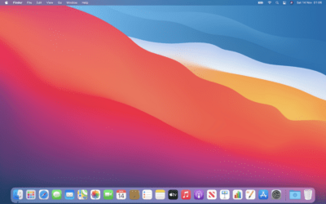Mac operating systems facts for kids
Mac operating systems are the special programs that make Apple computers work. They were created by Apple Inc. in two main stages.
The first Mac operating system, known today as the classic Mac OS, came out in 1984 with the very first Macintosh computer. It was called "System Software" back then. This system was on every Macintosh until 2002. People liked it because it was easy to use, but it didn't have some newer features that other computer systems had.
The current Mac operating system is called macOS. It was first named Mac OS X, then OS X, and finally macOS. Apple started developing it in 1997 after buying a company called NeXT. macOS is built on a different, more modern foundation called Unix. This new design fixed many problems the classic Mac OS had, like how it handled computer memory. macOS comes pre-installed on all new Macs and gets a big update every year. It's also the base for Apple's other device systems, like iOS for iPhones, iPadOS for iPads, watchOS for Apple Watch, and tvOS for Apple TV.
Before macOS, Apple tried out other ideas. They made systems like A/UX and MAE to help Macs work with Unix systems. Apple also worked on new versions to replace the classic Mac OS in the 1990s, but these projects, like Star Trek and Copland, were never finished.
Even though the classic Mac OS and macOS are built differently, they share many similar features. Both have a menu bar at the top of the screen. They use the Finder to show your files and apps as icons on a desktop metaphor. You can organize files in folders and delete them by dragging them to a trash can. Both systems also let you open many windows at once to do different tasks.
Apple's journey with operating systems started even before the Macintosh. In 1977, their Apple II computers used systems like Apple DOS and ProDOS. The Lisa computer in 1983 used Lisa OS. Apple also made Newton OS for its Newton handheld devices from 1993 to 1997.
Since 2007, Apple has launched several new operating systems based on the core of macOS. These include iOS for iPhones and iPads, watchOS for Apple Watch (since 2015), tvOS for Apple TV (since 2015), and visionOS for the Apple Vision Pro headset (since 2024).
Contents
Classic Mac OS: The Original System
The classic Mac OS was the first operating system for Macintosh computers. It was launched in 1984 with the first Macintosh and was the main system used on Macs until Mac OS X arrived in 2001.
Apple released the original Macintosh on January 24, 1984. Its early software was partly based on Lisa OS and inspired by the Xerox Alto computer. It was first called "System Software." Apple changed its name to "Mac OS" in 1996.
Classic Mac OS had a simple design. Early versions could only run one app at a time. Later versions, like System 5, allowed you to switch between apps. System 7 added features like virtual memory, which helped run bigger programs. People found it easy to use, but it had some limits, like how it handled memory and how it could sometimes have problems with extra features called "extensions."
Classic Mac OS: Main Versions
There were nine main versions of the classic Mac OS. The name "Classic" also refers to a special tool that helped older apps work on the newer macOS.
- Macintosh System Software – "System 1", released in 1984
- System Software 2, 3, and 4 – released between 1985 and 1987
- System Software 5 – released in 1987
- System Software 6 – released in 1988
- System 7 / Mac OS 7.6 – released in 1991
- Mac OS 8 – released in 1997
- Mac OS 9 – the last major version, released in 1999
macOS: The Modern System

This system started as Mac OS X, then was called OS X from 2012 to 2016, and is now known as macOS. It officially took over from the classic Mac OS in 2001.
Even though it was marketed as "version 10" of Mac OS, macOS has a very different history. It's a Unix-based operating system built on technology from NeXTSTEP. Apple bought NeXT in 1997, and its CEO, Steve Jobs, returned to Apple. macOS is based on Apple's open source Darwin operating system.
macOS is the foundation for many of Apple's other operating systems. These include iPhone OS/iOS for phones, iPadOS for tablets, watchOS for smartwatches, tvOS for Apple TV, and visionOS for mixed reality headsets.
macOS: Desktop Versions

The first version of macOS was released on March 24, 2001. It introduced the colorful Aqua user interface. Since then, many more versions have been released, adding new features. Since 2011, new versions have come out every year.
- Mac OS X 10.0 – codenamed "Cheetah", released March 24, 2001
- Mac OS X 10.1 – codenamed "Puma", released September 25, 2001
- Mac OS X Jaguar – version 10.2, released August 23, 2002
- Mac OS X Panther – version 10.3, released October 24, 2003
- Mac OS X Tiger – version 10.4, released April 29, 2005
- Mac OS X Leopard – version 10.5, released October 26, 2007
- Mac OS X Snow Leopard – version 10.6, unveiled June 8, 2009
- Mac OS X Lion – version 10.7, released July 20, 2011
- OS X Mountain Lion – version 10.8, released July 25, 2012
- OS X Mavericks – version 10.9, released October 22, 2013
- OS X Yosemite – version 10.10, released October 16, 2014
- OS X El Capitan – version 10.11, released September 30, 2015
- macOS Sierra – version 10.12, released September 20, 2016
- macOS High Sierra – version 10.13, released September 25, 2017
- macOS Mojave – version 10.14, released September 24, 2018
- macOS Catalina – version 10.15, released October 7, 2019
- macOS Big Sur – version 11, released November 12, 2020
- macOS Monterey – version 12, released October 25, 2021
- macOS Ventura – version 13, released October 24, 2022
- macOS Sonoma - version 14, released September 26, 2023
- macOS Sequoia - version 15, released September 16, 2024
macOS Big Sur changed the version number from 10.x to 11.0.
macOS: Server Versions
A special version of macOS for server computing was released in 1999. It was called Mac OS X Server 1.0. Later, server features were offered as an add-on for the regular desktop system.
Other Apple Operating System Projects
Apple also worked on other operating system projects, some of which were released, and some were cancelled.
Projects That Were Released
A/UX
In 1988, Apple released A/UX, which was a UNIX operating system that still looked and felt like a Mac. It was mainly sold to the U.S. government.
Macintosh Application Environment (MAE)
The Macintosh Application Environment (MAE) was a software package from Apple in 1994. It allowed some Unix computers to run Macintosh apps. It was stopped in 1998.
MkLinux
MkLinux was an open source project started by Apple in 1996. Its goal was to make Linux work on Macintosh computers.
Projects That Were Cancelled
Star Trek
The Star Trek project was a secret plan in 1992 to make the classic Mac OS work on Intel-based computers. It was cancelled in 1993, but some of its ideas helped when Mac OS was moved to PowerPC computers.
Taligent
Taligent was a project that aimed to create a new, advanced operating system to replace the classic Mac OS. It was a joint effort with IBM, but the project faced many problems and Apple left it in 1995.
Copland
Copland was another project at Apple to create a new version of the classic Mac OS. It was supposed to have modern features like better memory handling. However, too many new features were added too quickly, and the project kept getting delayed. Apple cancelled Copland in 1996 and decided to buy NeXT for its NeXTSTEP operating system instead.
Timeline
| Timeline of Mac operating systems |
|---|
 |
See also
 In Spanish: Mac OS para niños
In Spanish: Mac OS para niños
- Comparison of operating systems
- History of the graphical user interface
- Mac
- List of Mac software
 | Roy Wilkins |
 | John Lewis |
 | Linda Carol Brown |


